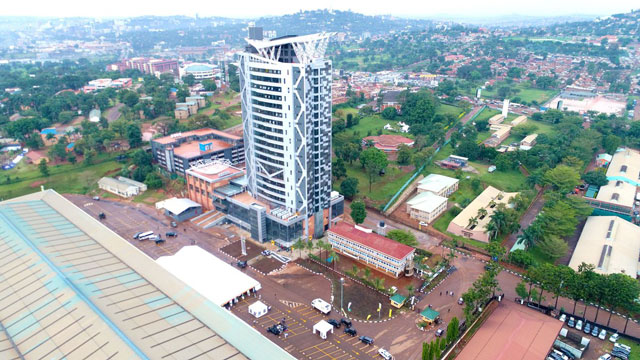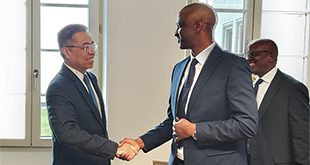
Kampala, Uganda | THE INDEPENDENT | Experts in the architecture and construction industry have said the defects on Uganda Revenue Authority-URA tower are not severe and peculiar and can be addressed.
Architect Enock Kibbamu, the chairman of the National Buildings Review Board (NBRB), said parties that put together the building must come together mutually, satisfy themselves scientifically on what is wrong and fix it. He said it could be one of the unforeseen occurrences.
At the beginning of the month, a video captured by a URA employee showed water entering the new building with staff running away from their desks. URA said the water entered through the louvres and atrium.
The public were quick to question how the 139 billion shillings building could leak. The building has 23 floors, making it the tallest in the country.
URA tower contractor, the Seyani Brothers, issued a statement distancing themselves from the defects. They said they had built what was in the design.
Kibbamu said the contractor’s statement was not necessary.
STATEMENT ABOUT ALLEGED FLOODING AT THE URA TOWER. pic.twitter.com/Qc3hxAeSu7
— Uganda Revenue Authority (@URAuganda) September 2, 2019
The building was designed by J.E Nsubuga & Associoates Limited.
To the experts, the consultant and the contractor were supposed to work in a close relationship with the former being the supervisor because they designed the building.
Engineer Fredrick Mubiru, a civil engineer, said that in most cases, consultants who cannot be on the site all the time employ clerk of works. This person, he said, notes everything that takes place at the site.
In case something is not right, the clerk notifies the contractor and it is rectified.
Mubiru said some of the defects that may appear on the building may be unforeseen occurrences by both the contractor and the consultant and can be addressed.
One being that in the contract, there is a defects liability period which is usually between six months to one year that requires the contractor to fix the defects that occur in that period.
According to Kibbamu, the unforeseen occurrences are common in the construction industry.
Kibbamu explained that they do simulations of experiences but sometimes even these may not be enough.
These help construction team to know which direction the prevailing wind is. He said one must simulate or know whether the area is earthquake prone or not.
They must also know in which direction the sun moves and ensure that the size of openings on the direction of the sand is reduced or do solar shedding.
He said these can be mitigated using materials made specifically to address nature impacts on buildings.
Asked how the matter can be resolved, Kibbamu said it was important for mutual respect from the parties involved.
He said the URA project was put up by majorly local content and Ugandans should be proud of it.
The experts said on the building of URA’s magnitude, all parties on the site from the developer, the consultant, ICT, environment engineer, electrical, and physical planner must know what happens at every stage of the building.
*****
URN
 The Independent Uganda: You get the Truth we Pay the Price
The Independent Uganda: You get the Truth we Pay the Price


